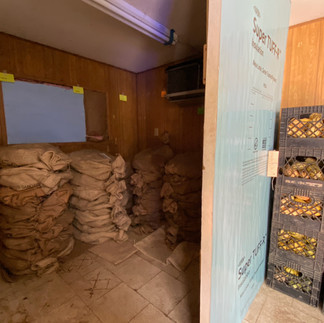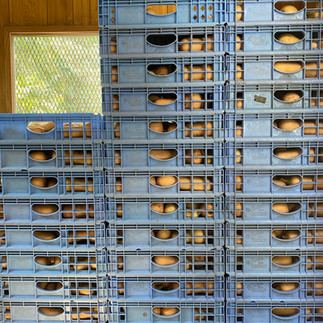Search
Autumn Fever
- Caroline Fanning
- Sep 13, 2021
- 3 min read
Updated: Sep 14, 2021
September 13, 2021

Last weekend the Old Bethpage Village Restoration hosted the 179th Long Island Fair. After a two-year hiatus due to COVID, it was wonderful to see the village come back to life for the annual event. The fair is Long Island’s version of a traditional county fair, in which communities gather in the fall to socialize, compete, and celebrate the end of the growing season. The first Long Island Fair was hosted in 1842, and as a scrappy start-up, it bounced from vacant lot to vacant lot until 1865, when it found a semi-permanent home in the Mineola fairgrounds. In the mid-20th century, it was displaced by suburban development, and in 1972 it resettled at the newly-opened Old Bethpage Village Restoration.
When Dan and I set up our first fair booth in 2007, we’d never heard of the fair and had little appreciation for its history, but as new farmers with bills to pay, we did appreciate the opportunity to make a buck. Fast forward several years, and we’ve come to appreciate the

fair for much more than that. The fair is the average Long Islander’s connection to our agricultural past. Whether they expect it or not, fairgoers get a taste of that past when they walk through the gate—yes there are circus acts and pony rides, but there are also historic buildings and farmhouses, craft demonstrations, and a 200-acre park where kids can run free. Street fairs are fine and all, but the Long Island Fair is special.
After the fair it's back to the grind. This being September, that means hauling, hauling, and more hauling. The winter squash and potatoes are halfway in, and sweet potatoes next in line…if only we can clear the way. They're bound for the greenhouses at the Tin House, but those at the moment are full of onions and squash. Every fall it’s a juggle to make everything fit, and I’ve given up the idea that we’ll ever figure it out for more than one year at a time. Instead, I’ve learned to appreciate the novelty and humor of each year’s scramble. Last year, for example, we created a walk-in closet of butternut, and someone dubbed me the Imelda Marcos of winter squash. This year, we walled off half the closet for potatoes, and I've been calling it the Potato Morgue, thanks in part to the working A/C—the 8'x8' room is dark, cold, and full of ominously large sacks. On the other side of the wall, we traded our closet shelves for crates, giving the space more of library look. If our harvests get any bigger, I may need a card catalogue to keep track of it all.
As families gear up for pumpkin and apple picking, it's tempting to lament the tourist trap many operations have become, but I won't indulge my inner farm curmudgeon. Instead, I’ll pass the microphone to Glenn. Many of you know him as the happy-go-lucky guy on the golf cart, but what you may not know is how hard he works on the other side of the farm to produce real-deal organic apples, berries, peaches, and more. Without further ado, here’s Glenn…

Greetings! I’m Glenn Aldridge, the caretaker of the orchard at Restoration Farm. It has been an unusual year here, particularly with the apple trees. This is my 8th year as caretaker, and I’ve never seen such a bountiful crop of apples about to ripen. There are some unusual varieties here, such as Roxbury Russet, Newtown Pippen, Black Gilliflower, and some newer disease resistant varieties such as GoldRush and Liberty.
I’d like to take credit, but I know it is all Mother Nature’s benevolence that has produced this crop. I did not spray the trees or the apples at all this year. They are completely chemical free. Please note that the Environmental Working Group has apples as #5 on their dirty dozen list of the most chemically laden fruits and veggies (strawberries are #1). One effect of not spraying is that most of the apples have a fair bit of sooty blotch. This is a fungal problem. It does not affect the taste or nutrition value of the apple. The blotch is not a health concern for humans, but for some, it might make the apple less appealing.
I’m looking for people who process apples into cider, juice, or apple sauce. I’m looking for people who bake. These apples will be fantastic for these purposes. All scraps from the processing are welcome back to Restoration Farm for our compost.
The apples are available at the Restoration Farm farm stand. Hours are available on the website. They are $2 per pound. Some may be slightly damaged but will be the best of the bunch. Volume discounts are available, particularly for grade B fruit. Please contact me at 516-816-5315 for more information or to order larger volumes.



























Comments